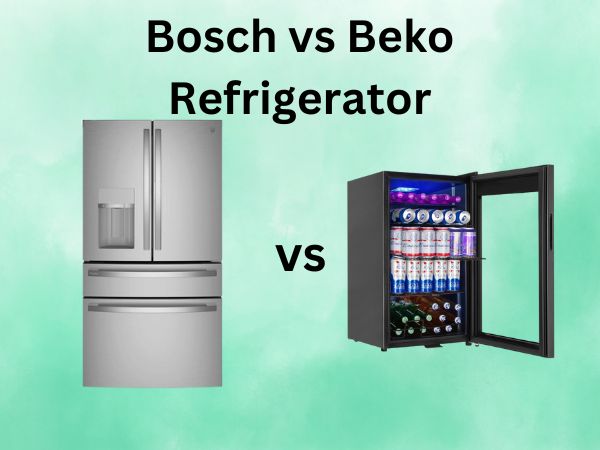Bosch vs Beko Refrigerator [The Ultimate Comparison Guide]
Are you standing in an appliance showroom, feeling overwhelmed by the choices between Bosch and Beko refrigerators? Or perhaps you’re scrolling through online retailers, comparing specs and wondering which brand truly deserves your hard-earned money? You’re not alone. Choosing between these two popular European brands can be challenging, especially when both offer compelling features at different price points.
In this comprehensive comparison guide, I’ll walk you through everything you need to know about Bosch and Beko refrigerators, from their design aesthetics to cooling technology, from storage capacity to long-term reliability. By the end of this article, you’ll have all the information needed to make an informed decision that perfectly suits your kitchen needs and budget.
Table of Contents
Brand Overview: Bosch and Beko in the Refrigeration Market
Before diving into specific features, let’s understand the heritage and market positioning of these two brands. This context often explains their design philosophy and price points.
Bosch: German Engineering Excellence
Bosch has built its reputation on German engineering precision and quality. Founded in 1886 by Robert Bosch, the company has grown into a global powerhouse known for premium household appliances. When it comes to refrigeration, Bosch positions itself in the upper mid-range to premium segment of the market.
What distinguishes Bosch refrigerators is their emphasis on precision engineering, innovative technology, and sleek, minimalist design. The brand caters to consumers who prioritize quality, durability, and are willing to invest more initially for long-term performance.
Beko: Affordable European Innovation
Beko, on the other hand, is a Turkish brand that has rapidly gained popularity across Europe and beyond. Founded in 1955 and now part of the Arçelik group, Beko has positioned itself as an affordable alternative that doesn’t compromise on essential features and technology.
Beko refrigerators are designed to offer great value for money, incorporating many modern features and technologies at more accessible price points. The brand particularly appeals to budget-conscious consumers who still want European design sensibilities and reliable performance.
Design and Aesthetics Comparison
Your refrigerator is likely the largest appliance in your kitchen, so its appearance matters significantly. Let’s see how Bosch and Beko approach design and aesthetics.
Exterior Design Elements
Bosch refrigerators typically feature clean lines and minimalist design cues. Most models offer fingerprint-resistant stainless steel finishes or glass-front options that exude a premium feel. The handles are often recessed or subtly integrated into the design, creating a seamless look. Bosch also offers panel-ready options that can be customized to match your kitchen cabinetry, perfect for those seeking a fully integrated kitchen aesthetic.
Beko refrigerators tend to offer more variety in exterior design. While they have sleek stainless steel options similar to Bosch, they also offer more colorful alternatives in some markets. Their designs generally feel contemporary but may not have the same premium finish quality as Bosch. That said, Beko has made significant strides in recent years to improve their visual appeal while maintaining affordability.
Interior Layout and Organization
Step inside both refrigerators and you’ll notice differences in interior design philosophy as well.
Bosch interiors typically feature LED lighting that illuminates every corner of the refrigerator. The light placement is strategic and often embedded in the sides as well as the top, eliminating dark spots. The materials used inside feel substantial, with thick glass shelves and solid plastic bins. Many Bosch models incorporate a sophisticated air flow system with multiple vents to ensure consistent temperature throughout.
Beko refrigerators also use LED lighting, though it may not be as comprehensive as Bosch’s system. The interior components are functional but may feel slightly less premium to the touch. However, Beko often maximizes space efficiency, sometimes offering more usable storage volume in similarly sized units compared to Bosch.
Shelving Systems and Flexibility
When it comes to adaptability, both brands offer adjustable shelving, but with different approaches.
Bosch often incorporates sliding, split, or folding shelves that can accommodate tall items without major reorganization. Their premium models feature the FlexBar, an innovative storage solution that utilizes typically unused space in the upper area of the refrigerator.
Beko focuses on practical solutions like adjustable door bins and shelves that can be reconfigured. While perhaps not as innovative as some Bosch features, they provide good flexibility for everyday use at a more accessible price point.
Performance and Technology Features
The heart of any refrigerator is its cooling performance and technology. This is where significant differences between Bosch and Beko become apparent.
Cooling Technology and Temperature Control
Bosch leads with its MultiAirFlow cooling system in most models, which circulates cold air evenly throughout the refrigerator to maintain consistent temperature and humidity levels. Many Bosch refrigerators also feature separate cooling circuits for the refrigerator and freezer compartments, allowing for more precise temperature control and preventing odor transfer.
Their VitaFresh technology creates specialized zones with optimal conditions for different types of food – near-freezing temperatures for meat and fish, and high-humidity compartments for fruits and vegetables. This technology can extend the freshness of produce by up to three times compared to standard refrigerator compartments.
Beko counters with its NeoFrost Dual Cooling technology, which, similar to Bosch’s system, uses separate cooling systems for the refrigerator and freezer. Their EverFresh+ technology aims to maintain optimal humidity for fruits and vegetables, though consumer feedback suggests it may not preserve freshness quite as long as Bosch’s VitaFresh.
Beko also offers Active Fresh Blue Light technology in some models, which continues the photosynthesis process in fruits and vegetables even inside the refrigerator, helping maintain vitamin content longer.
Energy Efficiency Ratings
Both brands perform admirably in energy efficiency, but with slight differences.
Bosch refrigerators typically achieve A++ to A+++ ratings on the European energy scale (or Energy Star certification in North America). Their focus on precision engineering extends to energy consumption, with many models incorporating variable speed compressors that adjust cooling power based on need rather than cycling on and off.
Beko has made energy efficiency a major selling point, with many models also achieving A++ or A+++ ratings. In fact, some Beko models are among the most energy-efficient in their price class, which can translate to noticeable savings on electricity bills over time.
Smart Features and Connectivity
The modern kitchen is increasingly connected, and both brands have responded to this trend.
Bosch has integrated its refrigerators into its Home Connect ecosystem, allowing for remote monitoring and control via smartphone. You can adjust temperatures, receive door-open alerts, or even check the contents of your refrigerator via internal cameras in select premium models. This integration extends to virtual assistants like Amazon Alexa and Google Assistant.
Beko offers smart connectivity in its higher-end models through its HomeWhiz platform, though the feature set isn’t quite as extensive as Bosch’s. Basic remote monitoring and control are available, but advanced features like interior cameras are generally absent from all but the most premium Beko offerings.
Storage Capacity and Organization Options
How much food can you store, and how easily can you organize it? Let’s compare the storage solutions from both brands.
Family-Sized Storage Solutions
Bosch refrigerators tend to be slightly more compact externally for the same internal capacity compared to some brands. Their focus on space efficiency means they can offer substantial storage even in models designed for smaller European kitchens. Most family-sized Bosch refrigerators offer between 500 and 600 liters (18-21 cubic feet) of total capacity.
Beko often provides excellent volume-to-price ratios, with many family models offering 550-650 liters (19-23 cubic feet). This slightly larger capacity can be advantageous for larger families or those who shop less frequently.
Specialized Storage Compartments
Beyond raw capacity, specialized compartments make a significant difference in food preservation.
Bosch’s VitaFresh Pro or VitaFresh Plus compartments maintain optimal humidity and temperature for specific foods. Many models include a dry zone for meats and cheese (around 32°F/0°C with low humidity) and separate high-humidity zones for fruits and vegetables that maintain freshness significantly longer.
Beko’s EverFresh+ technology similarly provides specialized storage with humidity control, though the temperature range may not be as precisely maintained as in Bosch models. Their blue light technology is unique and helps preserve vitamin content in fruits and vegetables.
Durability and Reliability Analysis
A refrigerator is a long-term investment, so durability matters significantly. How do these brands compare?
Build Quality Assessment
Bosch refrigerators have a reputation for solid construction and durability. Door hinges feel sturdy, drawers slide smoothly, and components generally have a substantial feel. This quality construction often translates to longer operational life, with many Bosch refrigerators running reliably for 10-15 years or more with proper maintenance.
Beko has improved its build quality significantly in recent years, but some components may still feel less robust compared to Bosch. Door seals and drawer mechanisms, in particular, might show wear earlier. However, for their price point, Beko refrigerators offer reasonable durability, with typical lifespans of 8-12 years.
Warranty Coverage Comparison
Warranty terms often reflect a manufacturer’s confidence in their products.
Bosch typically offers a 2-year warranty on all parts and labor, with an extended 10-year warranty on the compressor in most markets. Their customer service has a good reputation for responsiveness, though service availability may be better in urban areas.
Beko usually provides a standard 2-year warranty, with some models offering extended coverage on specific components. Their service network has expanded significantly but may still have less coverage than Bosch in some regions.
Price Point and Value for Money
Perhaps the most striking difference between these brands is their pricing strategy.
Initial Investment vs. Long-term Value
Bosch refrigerators command premium prices, typically ranging from $1,200 to $3,500+ depending on size and features. This higher initial investment is justified by superior build quality, advanced features, and potentially longer operational life. Energy efficiency may also contribute to lower running costs over time.
Beko offers significantly more affordable options, with comparable-sized refrigerators typically priced between $700 and $2,000. This accessibility makes Beko an attractive option for budget-conscious consumers or those furnishing rental properties.
When considering value, it’s worth calculating the total cost of ownership rather than just the purchase price. If a Bosch refrigerator lasts several years longer and uses less electricity, the higher initial cost might be offset over time.
Consumer Satisfaction and Reviews
What do actual users say about these brands? Consumer reviews and satisfaction surveys provide valuable insights.
Bosch consistently receives high marks for reliability, cooling performance, and quiet operation. Common praise points include the effectiveness of the VitaFresh system, intuitive controls, and overall build quality. The most frequent complaints tend to focus on the higher price point and occasionally limited availability of service technicians in some areas.
Beko receives positive reviews for its value proposition, with many users expressing surprise at the feature set available at lower price points. Energy efficiency is frequently praised, as is the contemporary styling. Common criticisms include slightly louder operation than premium brands and occasional issues with consistency in temperature maintenance.
Independent reliability surveys tend to place Bosch above Beko, though the gap has narrowed in recent years as Beko has improved its manufacturing processes and quality control.
Conclusion: Making the Right Choice
After comparing these two refrigerator brands across multiple criteria, the choice between Bosch and Beko ultimately comes down to your priorities and budget.
Choose Bosch if:
- You value premium build quality and are willing to invest more upfront
- Advanced food preservation technology is important to you
- You prefer German engineering with meticulous attention to detail
- You’re looking for seamless smart home integration
- Long-term reliability is a top priority
Choose Beko if:
- You’re working with a more limited budget
- You need maximum storage capacity for your money
- Energy efficiency is a primary concern
- You’re furnishing a rental property or second home
- You’re satisfied with good (rather than exceptional) food preservation features
Both brands offer quality refrigerators that will serve most households well. Bosch excels in premium features and long-term reliability, while Beko delivers impressive value and modern features at more accessible price points.
Ultimately, the best refrigerator is the one that meets your specific needs, fits your kitchen space, and aligns with your budget. Whether you choose the premium experience of Bosch or the value-oriented approach of Beko, understanding the differences highlighted in this comparison will help ensure you make a decision you’ll be happy with for years to come.




